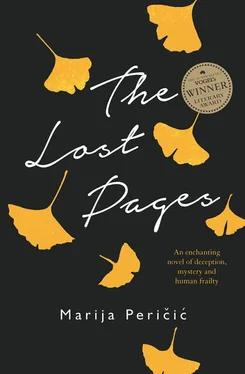Instead, the only people who came were the two orderlies, twinned in their muscular silence. They would hold on to my slippery arms, ignoring my wet skin and hair, which left damp patches on the fronts of their uniforms. Their dry, flat palms would push expertly onto my mouth, neatly holding my jaw together, covering my nose and making it difficult to breathe until the nurse arrived with her little cup. There seemed an endless supply of this medicine: no matter how many times I spat it out, sprayed it into the faces of the men, of the nurse, there came always another cup. Cup followed cup like an undefeatable army; it was useless to fight. I would allow the medicine into my mouth and from there it would slip inch by inch down my throat and everything would unravel again and I would slide down once more into that swirling, elastic world.
I began to learn that, when I surfaced, I must sit quietly in the bath and not draw attention to myself in any way. I learned to come up slowly, to creep into my own body and peer out through my eyes like a burglar creeping into a darkened house. I would look around the room moving my eyes only, and as I looked the words would begin to reattach themselves to the world. I wanted to shout with joy the moment when I had sat and looked, with my eyes turned down towards the bathwater, at the ten pink excrescences that were partly in, partly out of the water, and I discovered that I could move them at will, and their name came to me. Fingers. I would whisper the word to myself when I wanted to shout it: fingers . My fingers. I would move my lips a millimetre, feeling the way the muscles moved to shape the word and beaming with joy.
Then my eyes would move stealthily to the next object in the room and I would wait for the word to fly at me. I held all the words together in my head, shielding them, but as they gathered it became more and more difficult to keep them hidden silently within me. Eventually the name of some object in the room, or an emotion I was feeling, would come shouted out of my mouth.
I began to surface at other times too: in my bed, or walking across the lawns with the two silent orderlies. Slowly, I also became aware again of the hospital and my life before it. Anja, in particular, came back to me. I began to dream of her as I slept.
My awareness expanded to include the other people of the hospital; I began to recognise the nurses, the orderlies and Professor Pick. One day I woke to hear an echo of my breathing in the room and I realised that there was someone in one of the other beds. I hoisted myself up and saw that it was an old man with a large beard that covered the lower half of his face. The beard would have been white, but it lay on top of the bedclothes, whose bleached industrial whiteness turned the hair an unpleasant shade of yellow. We looked at each other silently for a long time.
Somehow, in that place, the usual daily social conventions lost their meaning, or, in any case, they seemed as unfamiliar and strange to me as the customs of a foreign culture. The words good morning materialised in my mind but seemed somehow wrong. I lay there and the stranger and I blinked at each other across the room. Eventually I realised that I could get out of bed and shake hands with him by way of greeting. As I got out of my bed, he did the same, and we met in the middle of the room, facing each other between the rows of empty beds.
I put out my hand, and so did the man. He was very tall and his body seemed to fit into his robe differently from mine: the fabric fell in sculptural folds from his wide shoulders like Roman drapery, and this, together with his beard, gave him the look of some prophet or ancient philosopher.
‘Promoli,’ he said to me, like a pronouncement. His voice was sonorous and the word had exactly the same intonation as the opening chords of the final movement from Beethoven’s String Quartet No. 16: the difficult decision. My head unexpectedly filled with this tune as our clasped hands pumped up and down through the air. Promoli . This was a word I had not heard before. Its syllables rolled through my head like a wave. I liked the word immediately; its shape and rocking-horse rhythm.
‘Promoli,’ I repeated, tasting the word, careful to use the same intonation that the man had used.
‘Promoli,’ he said again, but this time it was the beginning of a question: Beethoven’s ‘must it be?’ He frowned at me, waiting for an answer. His fingers let go of mine and drifted up to land on his chest.
I panicked as I felt the world slide away again from the language that anchors it and began to sweat as though I were standing before a professor in an oral examination. The man towered over me. Promoli, I thought to myself. Promoli. What is the reply? I stared at the man’s massive fingers where they brushed against his robe, level with my eyes. They were like carved objects, hewn from stone. Promoli. What was the meaning? I tried to attach it to a thing in the world, but it just hung like a loose string.
I had been silent too long and I said again, desperately, ‘Promoli,’ though I knew it was the wrong answer. My head dropped in shame and I looked down at my bare feet. I caught at the name for my two feet with relief and began to run through as many words for things as I could in order to anchor myself. I closed my eyes.
‘My friend,’ the man’s voice rumbled at me, ‘Promoli is my name. Your name is not that. At least, I have never yet met another Promoli, and I have lived a long time. Your name is…’
I still had my eyes closed and could feel the air shift as he stepped past me towards my bed to peer at the little white card. I held my breath as I waited for him to tell me my name, like waiting for a doctor’s diagnosis.
‘Brod,’ came his voice, through the dark of my lowered lids.
The word was familiar to me, but carried with it an unpleasant, musty odour of discomfort, of lack. I disliked its squareness, the way that the sound plopped from the lips straight to the floor, like a tasteless mouthful of food; chewed at slightly and then rejected. Another word scuttled about behind a screen in my mind; another, better name. I could not quite catch hold of it. It was a sharp one, mysterious, one that could take flight with clicks in the back of the throat.
And besides, brod : bread. Had I heard him correctly? I wanted to go and look at the card myself, but I was too ashamed. To be named after a food, the blandest, most basic food. It seemed an insult.
‘Brod,’ I said, watching him through my eyelashes, testing to see if it was right.
‘A good name.’ His face had a kindly expression and he nodded.
‘But Promoli, this is your name only, and not the name for any other thing in the world?’
‘I am the only Promoli.’
‘But brod . To eat?’ I mimed eating, moving my fingers to my lips, in case he did not understand. The other name came to me in a rush at that moment, it was the name too of a thing; of the jackdaw, kavka , Kafka. The k’s clicked like closing beaks, I saw it printed on a white page, the word took flight and became a bird in the tree outside, its whirring call. Kafka. A thief of a bird.
Brod and kavka are names for more than one thing in the world. My thoughts moved slowly, feeling their way. And I; I am a thing in the world connected to more than one name. There was no connection between bread and jackdaws except myself and some ink marks made on paper. I felt dizzy and sat on the edge of the nearest bed.
‘Yes, of course. Forgive me: Brod. I have been in this room for such a long time alone.’
Brod. Kafka. I let Kafka fly away. I offered Promoli my hand again, and he took it in both of his and held it for a long time.
Читать дальше












